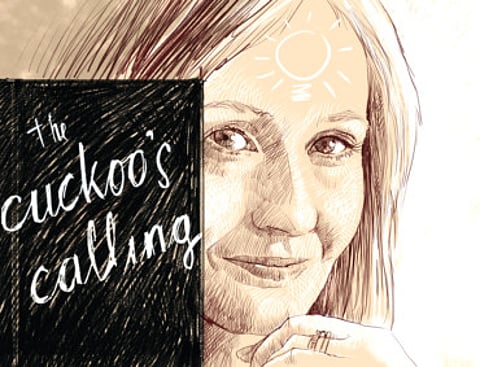J.K. Rowling: Fame by chance or true genius?
Cuckoo’s Calling will now have happy ending after Harry Potter creator revealed as author

The recent revelation that J.K. Rowling is the author of the critically acclaimed and — until now — commercially unsuccessful crime novel The Cuckoo’s Calling has electrified the book world and solidified Rowling’s reputation as a genuine writing talent: After all, if she can impress the critics without the benefit of her towering reputation, then surely her success is deserved.
And yet what this episode actually reveals is the opposite: That Rowling’s spectacular career is likely more a fluke of history than a consequence of her unique genius.
Whenever someone is phenomenally successful, whether it is Rowling as an author, Bob Dylan as a musician or Steve Jobs as an innovator, we cannot help but conclude that there is something uniquely qualifying about them, something akin to “genius,” that makes their successes all but inevitable.
Even when we learn about their early setbacks — Rowling’s original manuscript for Harry Potter and the Sorcerer’s Stone was rejected by no fewer than 12 publishers; Columbia Records initially refused to release Dylan’s Like a Rolling Stone; Jobs was booted from Apple in the mid-1980s — we interpret them as embarrassing oversights that were subsequently corrected rather than evidence that their success may have somehow been a product of luck or happenstance.
Several years ago, my colleagues Matthew Salganik and Peter Dodds, at Columbia University and I challenged this conventional wisdom with an unusual experiment. We set out to prove that market success is driven less by intrinsic talent than by “cumulative advantage,” a rich-get-richer process in which early, possibly even random events are amplified by social feedback and produce large differences in future outcomes.
To test our cumulative-advantage hypothesis, we recruited almost 30,000 participants to listen, rate and download songs by bands they had never heard of. Unbeknownst to the participants, they were randomly assigned to one of two groups: An “independent” group, which saw only the names of the bands and the songs; and a “social influence” group, whose participants could see how many times songs had been downloaded by others in the group. In addition, those in the social-influence group were assigned to one of eight different “worlds” that were created concurrently, allowing us to effectively “run” history many times.
If quality determined success, the same songs should have won every time by a margin that was independent of what people knew about the choices of others. By contrast, if success was driven disproportionately by a few early downloads, subsequently amplified by social influence, the outcomes would be largely random and would also become more unequal as the social feedback became stronger.
What we found was highly consistent with the cumulative-advantage hypothesis. First, when people could see what other people liked, the inequality of success increased, meaning that popular songs became more popular and unpopular songs became less so. Second and more surprisingly, each song’s popularity was incredibly unpredictable: One song, for example, came in first out of 48 we sampled in one “world,” but it came in 40th in another.
In the real world, of course, it is impossible to travel back in time and start over, so it is much harder to argue that someone who is incredibly successful may owe his or her success to a combination of luck and cumulative advantage rather than superior talent. But by writing under the pseudonym of Robert Galbraith, an otherwise anonymous name, Rowling came pretty close to re-creating our experiment, starting over again as an unknown author and publishing a book that would have to succeed or fail on its own merits, just as Harry Potter had to 16 years ago — before anyone knew who Rowling was.
Rowling made a bold move and, no doubt, is feeling vindicated by the critical acclaim the book has received. But there is a catch: Until the news leaked about the author’s real identity, this critically acclaimed book had sold only 500 to 1,500 copies, depending on which report you read. What is more, had the author actually been Robert Galbraith, the book would almost certainly have continued to languish in obscurity, probably forever.
The Cuckoo’s Calling will now have a happy ending and its success will only perpetuate the myth that talent is ultimately rewarded with success. What Rowling’s little experiment has actually demonstrated, however, is that quality and success are even more unrelated than we found in our experiment. It may be hard for a book to become a runaway bestseller if it is unreadably bad (although one may argue that the Twilight series and Fifty Shades of Grey challenge this constraint), but it is also clear that being good, or even excellent, is not enough. As one of the hapless editors who turned down the Galbraith manuscript put it: “When the book came in, I thought it was perfectly good — it was certainly well-written — but it didn’t stand out.”
Ironically, that is probably how those 12 editors felt about the original Harry Potter manuscript. Now, of course, they look like idiots, but what both our experiment and Rowling’s suggest is that they might have been right all along.
Had things turned out only slightly different, the real Rowling might have met with the same success as the fake Robert Galbraith, not the other way around. As hard as it is to imagine in the Harry Potter-obsessed world that we now inhabit, it is entirely plausible that in this parallel universe, Harry Potter and the Sorcerer’s Stone would just be a “perfectly good” book that never sold more than a handful of copies; Rowling would still be a struggling single mother in Manchester, England; and the rest of us would be none the wiser.
— Washington Post
Duncan J. Watts is a principal researcher at Microsoft Research and author of Everything Is Obvious (Once You Know the Answer): How Common Sense Fails Us.



